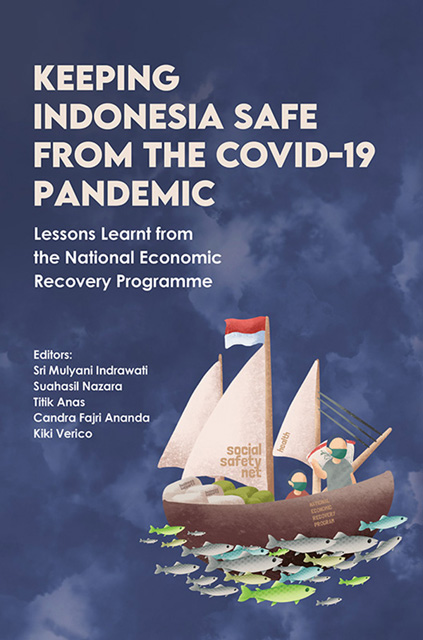 Keeping Indonesia Safe from the COVID-19 Pandemic
Keeping Indonesia Safe from the COVID-19 Pandemic Book contents
- Frontmatter
- Contents
- List of Figures
- List of Tables
- List of Boxes, Annexes and Appendixes
- Acknowledgements
- Glossary
- The Contributors
- Foreword: Keeping Indonesia Safe from the COVID-19 Pandemic Lessons Learnt from the National Economic Recovery Programme
- Part I Health Shock
- Part II Economic Shock: The Framework
- Part III Revenue Shock And Response
- Part IV Expenditure Side (Human Capital)
- Part V Expenditure Side (Msmes And Corporate Sector)
- Part VI Regional Dynamics
- Part VII New Ways Of Working
- Index
5 - Financing to Save Indonesia
Published online by Cambridge University Press: 30 June 2023
- Frontmatter
- Contents
- List of Figures
- List of Tables
- List of Boxes, Annexes and Appendixes
- Acknowledgements
- Glossary
- The Contributors
- Foreword: Keeping Indonesia Safe from the COVID-19 Pandemic Lessons Learnt from the National Economic Recovery Programme
- Part I Health Shock
- Part II Economic Shock: The Framework
- Part III Revenue Shock And Response
- Part IV Expenditure Side (Human Capital)
- Part V Expenditure Side (Msmes And Corporate Sector)
- Part VI Regional Dynamics
- Part VII New Ways Of Working
- Index
Summary
INTRODUCTION
COVID-19, the virus that caused a multidimensional crisis, has impacted every economy globally, including Indonesia. Having forced mobility restriction policies to restrain the spread of the virus, many countries have experienced a great lockdown recession, referred to as a significant drop in domestic economic activity (IMF 2020). This condition led to a substantial decline in household consumption and business activities, causing state revenues, especially tax revenues, to collapse due to a sudden halt in economic activity. On the other hand, the demands for funding the health sector, social safety nets and other expenditures for handling COVID-19 were rising as well as the need to accelerate national economic recovery. Moreover, the pandemic has also threatened the financial sector with a sharp drop in the economy evoked an appetite to hold deposits and only the most liquid asset.
The pandemic crisis is also more alarming due to the uncertainty of the virus mutation and yet has massively scarring effects for people. The spread of Delta variant waves with high casualties and followed by economic pressure in mid-2021 was evidence of the uncertainty of the impact of the pandemic. Therefore, fiscal policy in Indonesia has expanded since 2020, and as a countercyclical measure, it has continuously played an essential role in protecting the poor and vulnerable until now. In a time of crisis, a fiscal response is necessary and has to be timely. However, questions arise about whether the government can prepare the financing instrument that performs yet are credible to the financial market to support the stimulus.
This chapter discusses Indonesia's experience in fulfilling financing needs during the pandemic to support the government's strategies for economic recovery. Firstly, this chapter examines the policies in responding to the unprecedented crisis, followed by the challenges and opportunities during the crisis and the strategies for utilizing financing instruments to support the budget. Lastly, this chapter ends with some lessons learnt and the way forward.
NECESSARY FISCAL RESPONSE TO STABILIZE THE ECONOMY
In the past decades, the government has utilized the State Budget (Anggaran Pendapatan dan Belanja Negara, or APBN) as a measure to boost economic growth through national priority programmes, which have multiplier effects, such as infrastructure provision, improving quality of health and education, as well as bureaucratic reforms.
- Type
- Chapter
- Information
- Keeping Indonesia Safe from the COVID-19 PandemicLessons Learnt from the National Economic Recovery Programme, pp. 147 - 184Publisher: ISEAS–Yusof Ishak InstitutePrint publication year: 2022


